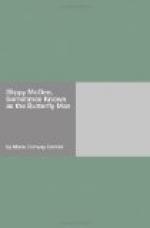Mary Virginia tore up the note and returned the violets by way of answer.
When she returned to school, the superioress regretted that she had been allowed to visit Mrs. Baker again, because too much gaiety wasn’t good for her, and she was falling off in her studies. The other girls said she had lost all her looks, for in truth she was wan and peaked and hollow-eyed. Seventeen suffers frightfully, when it suffers at all. Eighteen enjoys its blighted affection, revels in its broken heart, would like to crochet a black edging on its immortal soul, and wouldn’t exchange its secret sorrow for a public joy. Nineteen is convalescent—pride would come to its rescue even if life itself did not beguile it into being happy.
Mary Virginia got back her color and her appetite and forgot to remember that her heart was incurably broken and that she could never love again. She liked to think her painful experience had made her very wise. Then she went abroad, and her cure was complete. The result of it all was that poise and pride which had so greatly delighted the autocratic old kinswoman whose fiat had set the last seal of social success upon her.
When one of life’s little jokes flung Hunter into Appleboro and she had to observe him with impartial and less ingenuous eyes, she forgave the simple schoolgirl’s natural mistake. He had not changed, and she perceived his effect upon others older and wiser than herself. And her pride chose neither to slight nor to ignore him now, but rather to meet him casually, with indifference, as a stranger in whom she was not at all interested.
Mr. Inglesby she did not take seriously. She did not dream that a possible menace to herself lay in this stout man whom she considered fatuous and absurd, when she thought of him at all. That her mother should be completely taken in by his specious charity and his plausible presentment of himself, did not surprise her. She was inclined to smile scornfully and so dismiss him.
She underestimated Inglesby.
The very fact that there was such an obstacle in the way as a young fellow with whom she fancied herself in love only deepened Inglesby’s passion for Mary Virginia. She was in her proper person all that he coveted and groveled to. To possess her in addition to his own wealth—what more could a man ask? Let Eustis become senator, governor, president, anything he chose. But let Inglesby have Mary Virginia by way of fair exchange.
Mr. Inglesby was well aware that Miss Eustis would not for one moment consider him—unless she had to. He proposed to so arrange affairs that she had to. Naturally, he looked to his private secretary to help him bring about this desirable end. And at this opportune moment fate played into his hands in a manner that left Mr. Hunter’s assent a matter of course.




